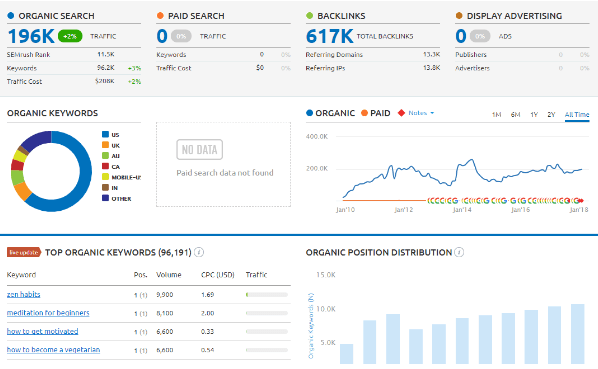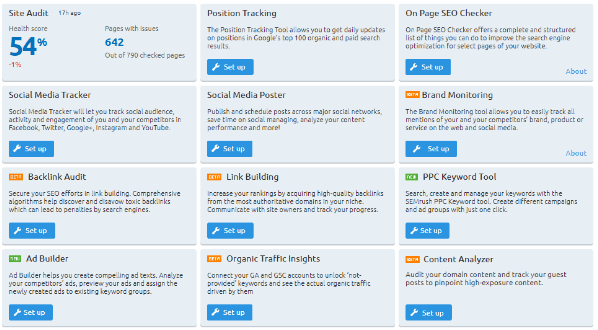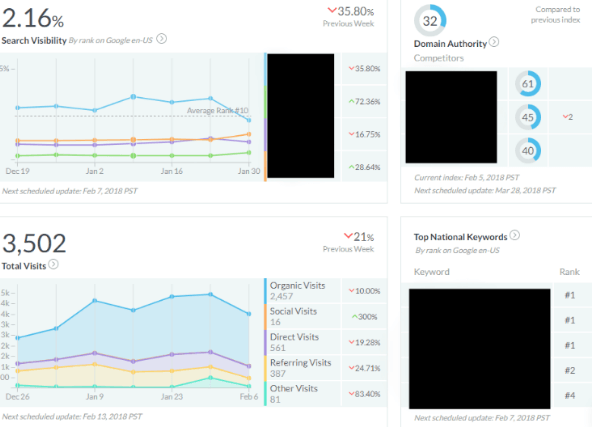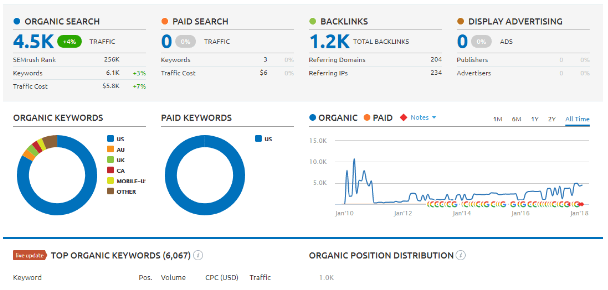
SEMRush vs Moz Pro Comparison: Which is Better?
As one of the SEO leads at WebMechanix, I work with many B2B businesses to improve their rankings. Day in and out, I have to use the best tools to get the job done. That’s when our agency ran into the problem of which tool was better, SEMRush vs. Moz Pro.
Both of these tools are among the most respected and recognized tools in the SEO world. Both are quite comprehensive in what they could do but since many of their features converged, we had to decide which one had to go.
This was a hard decision because both tools had so much to offer, but we decided on SEMRush. The following article will provide an honest comparison on each SEO tool’s main features.
We’re not sponsored by either company so this is a transparent SEO tools comparison and review, plus an explanation of why we made the decision we did.
Keyword Research: SEMRush’s Keyword Magic vs Moz’s Keyword Explorer Review
SEMRush keyword research tool is called the “Keyword Magic Tool.”
Their keyword tool gives hundreds of suggestions on keywords to target, just like Moz’s. But it has clearly been built starting with a PPC perspective. For example, they will come up with keyword ideas based on your seed keywords and you can filter by broad match, phrase match, or exact match, number of words, statements or questions, words it begins with, word it ends with, keywords it contains, keywords it doesn’t contain, or difficulty.
Surprisingly, this actually is a benefit since those filter choices are quite useful and other tools don’t usually offer these filters.
Moz’s tool, called Keyword Explorer, is just as powerful. It will give you a couple hundred keyword ideas based on the seed phrase you type in.
It’s filtering may arguably be more powerful, as it lets you sort by a few innovative methods, including “related to keywords with similar search results”, “closely related topics”, “broadly related topics”, “only include keywords with all query terms”, and “a mix of sources.”
The one downside that only constant use will uncover is that the tool isn’t always accurate. Such creative filtering options requires a qualitative algorithm and that’s hard to get right.
Filtering by similar search results, for example, seemed like a Holy Grail way to find SEO keyword ideas, but the results that show up are often less than ideal. You get broadly related terms that aren’t always relevant.
Both tools are about evenly matched for this area. Moz has a slight advantage because it makes up for its inaccurate filters with search volume accuracy.
Google’s Keyword Planner does a nasty thing of combining the average searches per month of closely related search phrases, synonyms, and plurals and singulars. The problem is that it fails to pick up search volume on keywords that have a bit of volume (10 per month is usually the threshold where these inaccuracies occur) or it overestimates by lumping too many things together.
Moz Pro displays its own unique search volume for each keyword, which clearly separates each related keyword out into its own search volume for a more accurate picture. I would peg Moz search volume as being a bit more accurate than SEMRush.
Keyword Gap
SEMrush’s Keyword Gap tool offers a Venn Diagram comparison between keyword profiles of up to five competitors.
Enter the domains and choose the types of keywords you care about (organic, paid, or PLA). The report will then show you all of the opportunities, keyword overlap, and more.
Additionally, you can see the keywords your competitor is ranking for that you are not in a visual way and compare mobile to desktop. You can even filters by metrics, such as Volume. And the business account lets you compare subdomains or subfolders.
Competitive Keyword Analysis
SEMrush is one of the most thorough, accurate tools when it comes to telling you all the keywords your competitor’s pages rank for. Nothing comes close.
If there’s one thing that makes SEMRush shine, it’s this.
I’ve checked the accuracy of this tool many times with actual data from Google and it’s quite accurate. When you compare the thoroughness of results with other tools that do this, like SpyFu, the difference is staggering. SpyFu will only show a small fraction of keywords that actually rank for a page and those keywords and their ranking will often be a bit inaccurate.
The best part? It takes less than a second for SEMRush to give you all the data. I don’t know how they do it but it’s amazing. That’s their secret sauce.
Moz currently doesn’t offer this feature. What it does offer is a comparison of the ranking keywords of your root domain with up to 2 other competitors’ root domains. It offers a Venn Diagram theme that identifies which keywords you both rank for and which keywords only one of you ranks for. (You can get to this feature under the Keyword Explorer tool but selecting root domain, subdomain, or exact page under the search option.)

Having said that, SEMRush and SpyFu can do the same. And since Moz just rolled this out, SEMRush tool is likely more accurate since it’s had more time to iron out inaccuracies.
While this is better than nothing, it doesn’t dive into the real meat of competitor analysis.
The real power of this tool is the ability to immediately discover all your competitors’ ranking organic keywords and positions.
It also brings up the estimated search traffic for each keyword and the percent of keywords that are Branded search.
Get a 7-Day Trial of SEMrush here.
Keyword Tracking Over Time
With SEMRush, you can do instant keyword rank change checks over any specified period of time.
With Moz, tracking keyword performance isn’t retroactive. Therefore, if you just submitted a keyword, it’ll keep tabs going forward but you can’t check your ranking performance over the last 6 months or year.
In terms of accuracy, SEMRush may be slightly better. We’ve been using Moz for a while now and had some doubts about the accuracy of the data.
Sometimes, we’ll sort by position change to see which keywords moved up the most and Moz loves showing a bunch of keywords with “No Search Volume Data” that have moved up 99 positions to Rank #1. It’s basically saying that a bunch of keywords with less than 10 searches per month shot up to the top. But when we double-check stats, it’s a different story.
Going straight to Google search results in an incognito window tells a different story. We sometimes don’t find our page listed anywhere close to rank #1 for those keywords or for keywords with substantial search volume that were reported to rank in the top ten. Sometimes, they’re not even on the search results.
My theory is that this inaccuracy is a result of the large amount of data that Moz has to work with and the slow frequency in which it updates that data. But who knows? It could be an even bigger root cause.
SEMRush Vs. Moz Analytics Review
SEMRush offers its own suite of metrics for SEO. My favorites include:
- SERP features (which features your keyword occupies in search results, including Local Packs, Answer Boxes, Featured Snippets, Related Questions, etc.)
- A fairly accurate report on keyword position changes over any period of time
- The number of total competing results in Google
- Their own Keyword Difficulty metric
- Desktop vs. Mobile filtering
- Country filtering

SEMRush also has a tool called SEO Idea Units. This offers ideas for how to get a page to rank for a particular keyword. The include insights around link building, technical SEO, UX, SERP features, semantic and content ideas.
Moz also has some great metrics, some of which are based on their own secret algorithm:
- SERP features
- Page Authority
- A Priority metric
- Domain Authority
- A Difficulty metric
- An organic CTR metric
- A more accurate, precise search volume metric (as mentioned earlier)
You can also bulk submit a list of keywords and it will spit out these metrics for you in 5 minutes or less.
Honestly, Moz wins here.
Their domain and page authority metric have been well known since the dawn of SEO and is still quite accurate in estimating the competitiveness of your site or any other site.
Although some of our team have doubts about how accurate it is, it is still a strong standard SEO’s use to measure pages and sites by.
Not to mention, the other metrics Moz offers are also great for assessing the value of ranking for a keyword and probability you can rank for it. I mean, that organic CTR number is quite interesting and hard to get!
Plus, some of these metrics can be double-checked on your own for accuracy if you don’t trust Moz. For keywords you know are extremely competitive, you can see if the Priority and Difficulty metric match up.
Backlink Profiles
As far as backlink profiles are concerned, both tools have fairly similar and comprehensive features. SEMRush has the slight edge since it also has charts that categorize different backlink types by percentage.

These categorizations include:
- source country.
- follow vs nofollow.
- what % of links are text vs image vs form.
I wouldn’t put too much weight into this. While these extra metrics are cool, they are not that impactful for SEO. The one exception would be the ability to sort by anchor text occurrences. For large competitor sites, it’s a good way to identify which topics and blog posts are attracting the most links so you can replicate that effort.
It will even mark backlinks that you used to have but lost in the report.
Client Organization and Tools
When you have multiple sites or clients, you need a tool that can manage all the data, tracking, and reporting for each cleanly.
SEMRush has a Projects feature you can set up for specific domains (clients). It’s a bit tucked away (it’s a button called Projects far down the left sidebar) and contains all the agency-focused tools it offers.
Many of the features look like they’re brand new since they have the “Beta” marker on them. Since they’re still in Beta, they aren’t as built out and seamless as you would like. Having said that, SEMRush has a lot of cool features in here, like brand monitoring, an exceptional SEO auditor, and a content analyzer, many are still in Beta so all the kinks haven’t been worked out.

Moz has a set of client-management features under its Clients section that have been launched and tested for a while. They work well for organizing and tracking the performance of different websites. The only big issue would be the accuracy of its keyword tracking performance, which I mentioned earlier.
Executive Dashboards
Both Moz and SEMRush have an executive dashboard that provides an overview of how your search engine optimization efforts are working for you. The biggest differentiator between the two is the KPIs each deems most important.
Moz has its proprietary value scale (Domain Authority and Page Authority) that they show at the top of their dashboard right away. They also highlight organic visibility and traffic for you vs. your competitors.

They have boxes for top national and local keywords that show the keyword, rankings, external links, and competitor keyword rankings but it feels more like an “oh, by the way, these metrics are useful too” rather than a “hey, this is actionable information you need to pay attention to”. You’re able to view this data in two different time frames: weekly or monthly.
SEMRush takes an approach with a difference you can spot right away. Rather than focus on where the tracked website ranks on a proprietary scale, they show traffic data for organic search, paid search, backlinks, and paid advertising along the top.

The second panel breaks down traffic by country and shows a graph that outlines the organic/paid mix. They also include metrics for top organic keywords, organic position distribution, main organic competitors (based on SERP’s, not industry), a competitive positioning map, branded search traffic, brand vs non-brand breakdown and a branded traffic trendline.
That only gets us halfway down the page. There is data on paid, backlinks, indexation and more.
SEMRush vs Moz Pro Pricing
Moz Pro’s pricing ranges from $99 a month to $599 a month. If you pay yearly, you can save 20%.
Its most expensive plan gets you 100 tracked sites (campaigns), 7,500 tracked keywords and 5 million pages crawled a week. You get white-labeled reporting and a premium level of support whenever requested within business hours.
SEMRush’s pricing ranges from $99 to $375 a month. You can save up to $500 on the top package (17%) if you pay yearly.
Its most expensive plan, the Business plan, includes 200 tracked sites, 5,000 tracked keywords, and 1 million page crawls.
Get a 7-Day Trial of SEMrush here (affiliate link)
SEMRush vs Moz Conclusion (TL;DR)
Overall, we decided that SEMRush was better.
But both have its strengths and weaknesses.
Moz is better at agency-focused client features. SEMRush Projects features aren’t as built out since they’re new, while Moz has client management features that have been launched and tested for a while.
It’s suite of metrics, like Organic CTR, Difficulty, and Domain Authority, are proprietary and quite useful for SEO.
SEMRush is better for getting specific, accurate SEO data — almost anything you can imagine — and displaying it in a way that is easy to read and export. Where it really shines is its competitor organic data, which can give you all the keywords a competitor’s page is ranking for, which is very helpful for SEO or PPC keyword research. And it’s also extremely accurate. It’s metrics and filtering options are incredible. And it’s new keyword research and SEO audit tools are quite impressive as well.
SEMRush filtering options for keywords and backlinks is also on point.
The one big differentiator between the tools would be accuracy and thoroughness of data. SEMRush takes the cake for this. Being able to accurately track your keyword performance and report on it for any range of time is important for client reporting and staying accountable. Also, Moz’s data can sometimes be inaccurate, which can destroy trust and cause confusion when assessing your performance.
Winner: SEMRush
Try Out SEMRush for Free
Get a 7-Day Trial of SEMrush here.
Full disclosure: Since we’ve switched and we’re savvy entrepreneurs, we set up an affiliate account with SEMRush. That means that if you try out SEMRush through our link above and decide to purchase, we get a commission at no extra cost to you. Our affiliation did not affect the article because it was written before we became affiliates.
Is Moz worth it? For some people, yes. Depending on your unique needs, you may place a higher value on the superior analytics and metrics that Moz provides or its Client management features. However, we decided to go with SEMRush.
Read about SEO competitor analysis
View all posts filed under “SEO”
Back to the main blog overview
Return to WebMechanix.com homepage
Most newsletters suck...
So while we technically have to call this a daily newsletter so people know what it is, it's anything but.
You won't find any 'industry standards' or 'guru best practices' here - only the real stuff that actually moves the needle.





